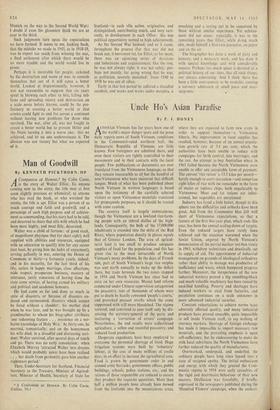Man of Goodwill
By KENNETH PICKTHORN,MP
A Companion of Honour,* by Colin Coote, is the story of Walter Elliot. To anyone coming new to the story, the title may at first seem slightly precious or whimsical; to anyone who, has read the book, or who watched the events, the title is apt. Elliot was a person of so much courage and faith and goodwill, and a personage of such high purpose and of achieve- ment so commanding, that his story had to be told, and deserved to share that title with which he had been most highly, and most fitly, decorated.
Walter was a child of fortune : of good stock, of magnificent physique (but for short sight), well supplied with abilities and resources, equipped with an education to qualify him for any career (not least, by giving him the habit of enjoyment), serving gallantly in war, entering the House of Commons at thirty—a fortunate youth, indeed; and in his maturity, for the last third of his life, sechre in happy marriage, close affections, wide respect, prosperous business, mastery of utterance, justly conscious of having done the state some service, of having earned his military and political and academic honours.
He had, come so far and done so much in spite of disasters, or because of disasters en- dured and surmounted, disasters which cannot be listed without a shudder: his mother died when he was four, and he was brought up by a grandmother to whom his biographer attributes `one redeeming feature . . . insistence on a ver- batim knowledge of Holy Writ.' At thirty-one, he married, romantically; and on the honeymoon his wife died, in a dreadful and distressing acci- dent; Walter survived, after several days of touch and go. There was no early consolation : when Elizabeth Murray 'attracted Walter into dreams which would probably never have been realised . . . her death from jpritonitis gave him another nightmare period.'
Then, Under-Secretary for Scotland, Financial Secretary to the Treasury, Minister of Agricul-. lure, Minister of Health, Secretary of State for
*A COMPANION OF HONOUR. By Colin Coote. (Collins, 36s.)
Scotland—in each role active, originative, and distinguished; contributing much, and very vari- ously, to development in each Office: this was political opportunity turned to high achievement.
As the Second War loomed, and as it came, throughout the process (for that war did not break out, it burrowed in), for Elliot, as for most, there was an agonising series of decisions and indecisions and acquiescences; like the rest, he was not always right; it was not solely, per- haps not mainly, for going wrong that he was, as politician, severely punished: from 1940 to 1958 he was out of office.
Early in that last period he suffered a dreadful accident, and weeks and weeks under morphia, a
smashing and a testing not to be conceived by those without similar experience. Yet achieve- ment did not cease: especially, it was in the remaining years that Elliot, while doing much else, made himself a first-rate journalist, on paper and on the air.
The biographer has done a work of piety and honesty, and a necessary work, and has done it with special knowledge and with considerable success. Perhaps too much space is devoted to a political history of our time, like all such things, not always convincing. And 1 think there has been a little over-anxiety to be readable, causing a too-easy admission of small jokes and near- epigrams.


































 Previous page
Previous page